初三英语语法复习-------时态和语态
英语语法:动 词 的 时 态 和 语 态
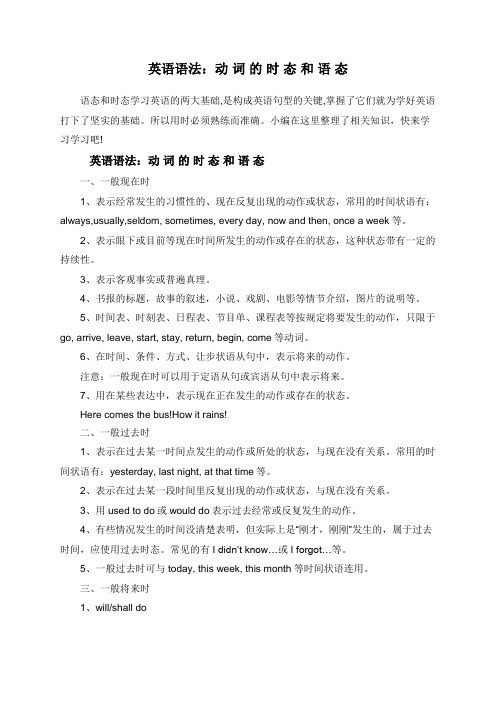
英语语法:动词的时态和语态语态和时态学习英语的两大基础,是构成英语句型的关键,掌握了它们就为学好英语打下了坚实的基础。
所以用时必须熟练而准确。
小编在这里整理了相关知识,快来学习学习吧!英语语法:动词的时态和语态一、一般现在时1、表示经常发生的习惯性的、现在反复出现的动作或状态,常用的时间状语有:always,usually,seldom, sometimes, every day, now and then, once a week等。
2、表示眼下或目前等现在时间所发生的动作或存在的状态,这种状态带有一定的持续性。
3、表示客观事实或普遍真理。
4、书报的标题,故事的叙述,小说、戏剧、电影等情节介绍,图片的说明等。
5、时间表、时刻表、日程表、节目单、课程表等按规定将要发生的动作,只限于go, arrive, leave, start, stay, return, begin, come等动词。
6、在时间、条件、方式、让步状语从句中,表示将来的动作。
注意:一般现在时可以用于定语从句或宾语从句中表示将来。
7、用在某些表达中,表示现在正在发生的动作或存在的状态。
Here comes the bus!How it rains!二、一般过去时1、表示在过去某一时间点发生的动作或所处的状态,与现在没有关系。
常用的时间状语有:yesterday, last night, at that time等。
2、表示在过去某一段时间里反复出现的动作或状态,与现在没有关系。
3、用used to do或would do表示过去经常或反复发生的动作。
4、有些情况发生的时间没清楚表明,但实际上是“刚才,刚刚”发生的,属于过去时间,应使用过去时态。
常见的有I didn’t know…或I forgot…等。
5、一般过去时可与today, this week, this month等时间状语连用。
三、一般将来时1、will/shall do(1)表示将来会出现的动作或状态。
外研版初三上学期英语语法总结及复习要点

外研版初三上学期英语语法总结及复习要点一、时态1一般现在时定义:表示经常、习惯或一般性的动作或状态,或表示客观事实。
结构:主语+ 动词原形/第三人称单数形式(+ 其他)。
例子:She always gets up early.(她总是起得很早。
)The sun rises in the east.(太阳从东方升起。
)2一般过去时定义:表示过去某个时间发生的动作或状态。
结构:主语+ 动词过去式(+ 其他)。
例子:She went to the park yesterday.(她昨天去了公园。
)I didn't know him before.(我以前不认识他。
)3一般将来时定义:表示将来某个时间将要发生的动作或状态。
结构:主语+ will/shall + 动词原形(+ 其他)。
例子:I will go to the cinema this evening.(我今晚将去看电影。
)They won't be late again.(他们不会再迟到了。
)4现在进行时定义:表示现在正在发生的动作或正在进行的状态。
结构:主语+ be动词(am/is/are)+ 现在分词(+ 其他)。
例子:She is studying hard.(她正在努力学习。
)They are playing football on the playground.(他们正在操场上踢足球。
)5过去进行时定义:表示过去某个时间正在发生的动作或状态。
结构:主语+ was/were + 现在分词(+ 其他)。
例子:When I called him, he was working in his office.(当我给他打电话时,他正在办公室工作。
)6将来进行时定义:表示将来某个时间正在发生的动作或状态。
结构:主语+ will be + 现在分词(+ 其他)。
例子:This time next week, they will be staying in a hotel in Paris.(下周这个时候,他们将住在巴黎的一家旅馆里。
初三英语知识点归纳

初三英语知识点归纳
1. 语法知识点
英语语法是学习英语的基础,初三英语语法知识点主要包括:时态、语态、虚拟语气、被动语态等。
掌握这些语法知识点可以帮助我们准确地表达自己的意思,提高文章的语法正确性。
2. 词汇知识点
初三英语词汇量的要求比较高,需要掌握大量的单词和短语。
常见的词汇知识点包括常用动词、名词、形容词、副词、介词等。
在学习和使用单词的过程中,我们需要不断记忆和积累。
3. 阅读理解知识点
阅读理解是初三英语考试中占据很大比重的一个部分。
阅读理解题型包括选择题、填空题、短文综合题等。
为了提高阅读理解能力,我们需要多读英语书籍、文章和新闻,培养自己的阅读能力。
4. 写作知识点
初三英语写作主要包括写话题作文和翻译。
在写作过程中,我们需要注意使用词汇、语法和表达清晰的方式。
同时,我们还需要多阅读优秀的英语作品,学习一些优秀的写作技巧,从而提高自己的写作水平。
5. 听力知识点
初三英语听力考试难度较高,需要掌握一定的听力技巧,如抓住关键词、注意听音节等。
我们还需要多听英语音频,并进行反复练习,提高自己的听力水平。
6. 口语知识点
初三英语口语考试涉及到日常用语、交际用语和口语表达能力。
我们需要多听英语对话、模仿英语发音并积极参与英语口语交流,从而熟练掌握口语表达能力。
THE TENSES AND VOICES 中学英语语法复习之时态和语态

1.I need one more stamp before my collection ______. A.has completed
A.will finish B.shall finish C.finish D.have finished
1.People will laugh at you if you wear that dress.
eg.I will find out when the train leaves.
eg.The plane for San Francisco takes off at three p.m..
3)与一般现在时连用的时间状语:
every day, once a week, often, twice a week, usually, always, seldom, sometimes
2.─Your phone number again?I______quite catch it.
─It's 9568442.
A.didn't
B.couldn't
C.don't
D.can't
3.--Nancy is not coming tonight. --But she_____!
A.promises B.promised C.will promise D.had promised
tomorrow.
②表示将来的其他用法: ⑴be going to + v.表示打算, 准备做的事,或即将发生或 肯定要发生的事。
九上英语语法复习

动 词
时
态
1. 一般现在时(The present tense) 2. 一般过去时(The simple past tense) 3. 一般将来时(The simple future tense) 4. 现在进行时(The present continuous tense) 5. 过去进行时(The past continuous tense) 6. 现在完成时(The present perfect tense)
一般将来时表示将来某个时间要发生的 动作或存在的状态。
一般将来时其构成形式通常有以下两种: ■ will / shall + 动词原形 (shall用于第一人称) ■ be going to + 动词原形
next Monday / Tuesday/ week / month / year …(next系列) tomorrow, in the future , the day after tomorrow, soon, from now on, in two days, in 2020…
一般现在时 一般过去时 一般将来时 现在进行时 过去进行时 现在完成时
动词原形或 动词+s / es 动词过去式 will +v. am/is /are +v. ing was/ were +v. ing have /has +P.P
在as soon as引 导的时间状语 从句与if引导 的条件状语从 句中,用一般 表示经常性发生的动作、存在的状态、日 现在时表将来: 常行为、爱好、习惯性动作或客观真理、 Our sports meeting will be 科学事实等。 I go to school at 6:30 every morning. put off if it rains 我每天早上六点半去上学。 tomorrow.
英语的时态与语态

英语的时态与语态时态和语态是英语语法中非常重要的概念,它们对于正确表达和理解英语句子起着至关重要的作用。
在本文中,我们将探讨英语的时态与语态,深入了解它们的用法和区别。
一、时态时态是用来表示动作或状态发生的时间的一种语法形式。
在英语中,一般有过去时、现在时和将来时三种基本时态。
1. 过去时过去时用来表示过去发生的动作或状态。
一般过去时的构成是在动词原形后加上-ed,例如:walked, talked。
但也有一些不规则动词需要特殊记忆,例如:went, saw。
例句:- I walked to the store yesterday.(昨天我走到了商店。
)- She ate lunch an hour ago.(她一个小时前吃了午饭。
)2. 现在时现在时用来表示现在正在进行的动作或状态。
一般现在时的构成是动词原形,但第三人称单数要在动词后加上-s或-es。
例句:- I am reading a book now.(我现在正在看书。
)- He teaches English at the university.(他在大学教英语。
)3. 将来时将来时用来表示将来发生的动作或状态。
一般将来时的构成是在助动词will后加上动词原形。
例句:- I will go to the party tomorrow.(明天我将去参加派对。
)- They will arrive at the airport in two hours.(他们将在两小时后到达机场。
)二、语态语态是用来表示句子的主语和谓语之间的关系的一种语法形式。
在英语中,一般有主动语态和被动语态两种基本语态。
1. 主动语态主动语态表示主语是动作的执行者。
例句:- She wrote a letter.(她写了一封信。
)- He is washing the car.(他正在洗车。
)2. 被动语态被动语态表示主语是动作的承受者。
例句:- The letter was written by her.(这封信是她写的。
(人教版)中考英语总复习语法:专题8-动词的时态、语态(101页)

(2)过去完成时与现在完成时的主要区别是时间参 照点不同: 过去完成时的时间参照点是某个“过去的” 时间;现在完成时的时间参照点是“现在”。因此现在 完成时中的很多规则,也适用于过去完成时。 When I got to the cinema, the film had been on. 当我到达电影院时,电影已经开始了。
以辅音字母+y结尾的动词, 把y变为i再加-ed
以一个元音字母加一个辅音 字母结尾的重读闭音节词, 双写结尾字母再加-ed
study→studied carry→carried stop→stopped drop→dropped prefer→preferred
3.一般将来时 (1)表示将来某个时间要发生的动作或存在的状 态,其构成形式:“will/shall+动词原形”。常与表 示将来的时间状语tomorrow,next week,in+一段时 间等连用。 当主语是第一人称I或we时,问句中一般用shall。
③表单纯性的将来,与人的主观愿望和判断无关 时。 If it's made of wood, it will float on water. 这要是木材做的,它能浮在水面上。 (4)当主句为一般将来时态时,在if,as soon as, until, when等引导的状语从句中用一般现在时代替一 般将来时。 I will call you as soon as I get there. 我一到那儿就给你打电话。
特殊情况:have→has,am/are→is 考查热点:如果主句为一般将来时,if,unless等 引导的条件状语从句和when,until,as soon as等引导 的时间状语从句常用一般现在时表示将来。 What about going climbing if it doesn't rain tomorrow? 如果明天不下雨,去爬山怎么样?
初三英语Unit1-6复习(语法部分)知识精讲
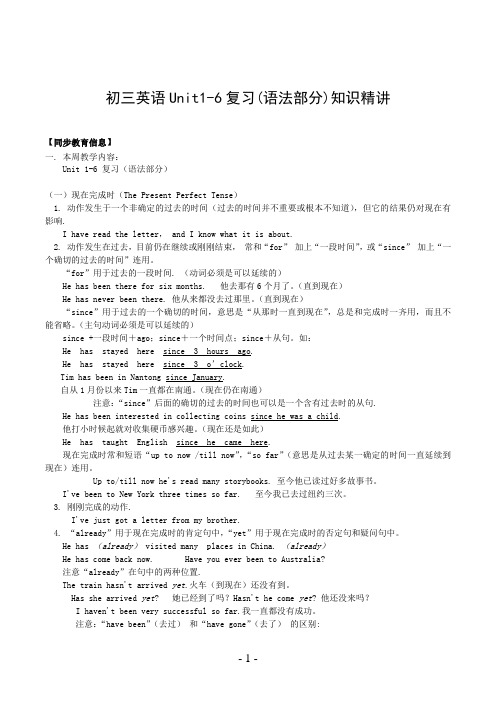
初三英语Unit1-6复习(语法部分)知识精讲【同步教育信息】一. 本周教学内容:Unit 1-6 复习(语法部分)(一)现在完成时(The Present Perfect Tense)1. 动作发生于一个非确定的过去的时间(过去的时间并不重要或根本不知道),但它的结果仍对现在有影响.I have read the letter, and I know what it is about.2. 动作发生在过去,目前仍在继续或刚刚结束,常和“for”加上“一段时间”,或“since”加上“一个确切的过去的时间”连用。
“for”用于过去的一段时间. (动词必须是可以延续的)He has been there for six months. 他去那有6个月了。
(直到现在)He has never been there. 他从来都没去过那里。
(直到现在)“since”用于过去的一个确切的时间,意思是“从那时一直到现在”,总是和完成时一齐用,而且不能省略。
(主句动词必须是可以延续的)since +一段时间+ago;since+一个时间点;since+从句。
如:He has stayed here since 3 hours ago.He has stayed here since 3 o’clock.Tim has been in Nantong since January.自从1月份以来Tim一直都在南通。
(现在仍在南通)注意:“since”后面的确切的过去的时间也可以是一个含有过去时的从句.He has been interested in collecting coins since he was a child.他打小时候起就对收集硬币感兴趣。
(现在还是如此)He has taught English since he came here.现在完成时常和短语“up to now /till now”,“so far”(意思是从过去某一确定的时间一直延续到现在)连用。
专题10 动词的时态和语态(课件)-2024年中考英语复习(全国通用)

14.(2022·湖北武汉·统考中考真题)—I don’t think sixteen-year-olds should be allowed
to drive. —I ________. It’s not safe. A.agree B.agreed C.will agree
D.had agreed
apples in the fridge now.
A.is
B.are
C.was
D.were
【答案】A 【解析】句意:现在冰箱里有一些果汁和几个苹果。考查一般现在时及 “there be”。根据“now”,排除过去时态的CD,由于there be的就近原则, some juice不可数,所以应是is。故选A。
5.(2023·甘肃白银·校考一模)Thanks to those cleaners who ________ hard on the streets, we can have a beautiful city. A.work B.worked C.have worked D.were working
真理。
时态的辨析 满分秘籍
易失分点
提分特训
时态 谓语动词
意义
例句
一般
表示过去
过去 was/were,did 的动作或
时
状态。
When he was a child, he often swam in the river.当他小的时候,他经常在河里游泳。
16.(2023·江苏南通·统考一模)—What will the weather be like tomorrow? —I was on the phone and ________ most of the weather report. A.have missed B.was missing C.will miss D.missed
英语语法 动词的时态和语态如何表达兴趣和态度
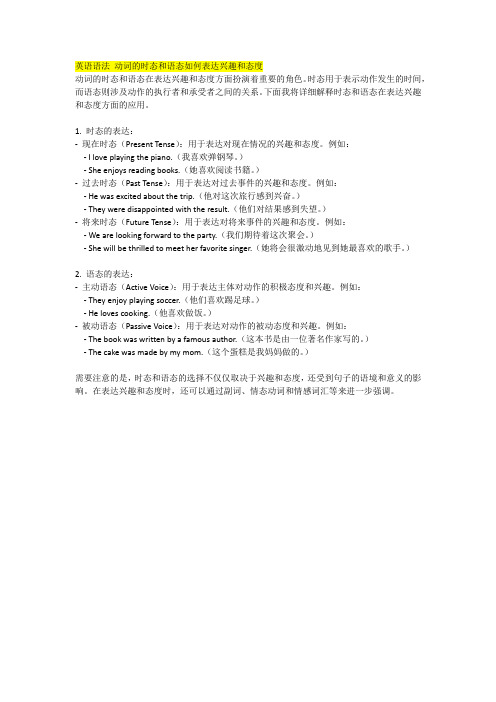
英语语法动词的时态和语态如何表达兴趣和态度动词的时态和语态在表达兴趣和态度方面扮演着重要的角色。
时态用于表示动作发生的时间,而语态则涉及动作的执行者和承受者之间的关系。
下面我将详细解释时态和语态在表达兴趣和态度方面的应用。
1. 时态的表达:-现在时态(Present Tense):用于表达对现在情况的兴趣和态度。
例如:- I love playing the piano.(我喜欢弹钢琴。
)- She enjoys reading books.(她喜欢阅读书籍。
)-过去时态(Past Tense):用于表达对过去事件的兴趣和态度。
例如:- He was excited about the trip.(他对这次旅行感到兴奋。
)- They were disappointed with the result.(他们对结果感到失望。
)-将来时态(Future Tense):用于表达对将来事件的兴趣和态度。
例如:- We are looking forward to the party.(我们期待着这次聚会。
)- She will be thrilled to meet her favorite singer.(她将会很激动地见到她最喜欢的歌手。
)2. 语态的表达:-主动语态(Active Voice):用于表达主体对动作的积极态度和兴趣。
例如:- They enjoy playing soccer.(他们喜欢踢足球。
)- He loves cooking.(他喜欢做饭。
)-被动语态(Passive Voice):用于表达对动作的被动态度和兴趣。
例如:- The book was written by a famous author.(这本书是由一位著名作家写的。
)- The cake was made by my mom.(这个蛋糕是我妈妈做的。
)需要注意的是,时态和语态的选择不仅仅取决于兴趣和态度,还受到句子的语境和意义的影响。
初中英语语法专项复习英语动词时态和语态讲解和练习题
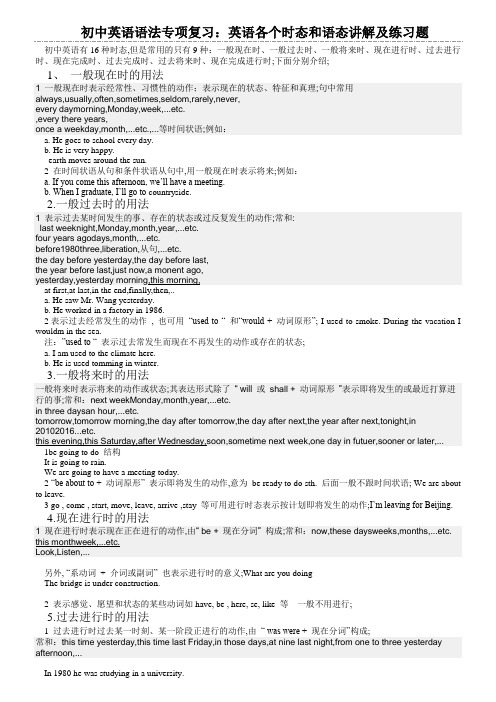
初中英语语法专项复习:英语各个时态和语态讲解及练习题初中英语有16种时态,但是常用的只有9种:一般现在时、一般过去时、一般将来时、现在进行时、过去进行时、现在完成时、过去完成时、过去将来时、现在完成进行时;下面分别介绍;1、一般现在时的用法1 一般现在时表示经常性、习惯性的动作;表示现在的状态、特征和真理;句中常用always,usually,often,sometimes,seldom,rarely,never,every daymorning,Monday,week,...etc.,every there years,once a weekday,month,...etc.,...等时间状语;例如:a. He goes to school every day.b. He is very happy.earth moves around the sun.2 在时间状语从句和条件状语从句中,用一般现在时表示将来;例如:a. If you come this afternoon, we’ll have a meeting.b. When I graduate, I’ll go to countryside.2.一般过去时的用法1 表示过去某时间发生的事、存在的状态或过反复发生的动作;常和:last weeknight,Monday,month,year,...etc.four years agodays,month,...etc.before1980three,liberation,从句,...etc.the day before yesterday,the day before last,the year before last,just now,a monent ago,yesterday,yesterday morning,this morning,at first,at last,in the end,finally,then,..a. He saw Mr. Wang yesterday.b. He worked in a factory in 1986.2表示过去经常发生的动作, 也可用“used to “ 和“would + 动词原形”; I used to smoke. During the vacation I wouldm in the sea.注:”used to “ 表示过去常发生而现在不再发生的动作或存在的状态;a. I am used to the climate here.b. He is used tomming in winter.3.一般将来时的用法一般将来时表示将来的动作或状态;其表达形式除了“ will 或shall + 动词原形”表示即将发生的或最近打算进行的事;常和:next weekMonday,month,year,...etc.in three daysan hour,...etc.tomorrow,tomorrow morning,the day after tomorrow,the day after next,the year after next,tonight,in 20102016...etc.this evening,this Saturday,after Wednesday,soon,sometime next week,one day in futuer,sooner or later,...1be going to do 结构It is going to rain.We are going to have a meeting today.2 “be about to + 动词原形” 表示即将发生的动作,意为be ready to do sth. 后面一般不跟时间状语; We are about to leave.3 go , come , start, move, leave, arrive ,stay 等可用进行时态表示按计划即将发生的动作;I’m leaving for Beijing.4.现在进行时的用法1 现在进行时表示现在正在进行的动作,由“ be + 现在分词” 构成;常和:now,these daysweeks,months,...etc. this monthweek,...etc.Look,Listen,...另外, “系动词+ 介词或副词” 也表示进行时的意义;What are you doingThe bridge is under construction.2 表示感觉、愿望和状态的某些动词如have, be , here, se, like 等一般不用进行;5.过去进行时的用法1 过去进行时过去某一时刻、某一阶段正进行的动作,由“ was were + 现在分词”构成;常和:this time yesterday,this time last Friday,in those days,at nine last night,from one to three yesterday afternoon,...In 1980 he was studying in a university.He was reading a novel when I came in.6.现在完成时的用法现在完成时由“have/has + 过去分词.其使用有两种情况:1 现在完成时所表示的动作在说话之前已完成,但对现在有影响;句中没有具体时间状语;常和:just,alreadly,yet,never,ever,now,before,this week,today,these days,once,twice,three times,...He has gone to Fuzhou.He has been to Fuzhou.2 现在完成时所表示的动作开始于过去,持续到现在,也许还会持续下去常用for 和since表示一段时间的状语或since then1949,last Monday,two o'clock,从句...,etc.,ever since then,for three daysa long time,two hours,...etc.so far , now, today, this wek month, year 等表示包括现在内的状语;He has studied English for 5 years.He has studied English since 1985.Now I have finished the work..注意:表示短暂时间动作的词如come, go , die, marry, buy 等的完成时不能与for, since 等表示一般时间的词连用;正确:I have bought the book already.错误:I have bought the book for two years.改:I have had the bookl for two years.7.过去完成时的用法1 过去完成时由“had + 过去分词”构成;过去完成时的动作表示过去某一时刻或某一时刻或某一动作之前完成的动作或状态;句中常用by then1977,yesterday,eight last night,the time we got there,...etc.by the end of last termweek,year,month,...etc..by, before, until, when 等词引导的时间状语;By the end of last year we had built five new houses.I had learnt 5000 words before I entered the university.2过去完成时的动词还可表示过去某一时刻之前发生的动作或状态持续到过去某个时间或持续下去;Before he slept, he had worked for 12 hours.8.过去将来时的用法过去将来时表示从过去的某个时间看来将要发生的动作或存在的状态;过去将来时由“should 或would + 动词原形” 构成;第一人称用should, 其他人称用would. ;常和:They were sure that they would succeed.二动词语态1.当句子的主语是动作的执行者时, 谓语的形式叫主动语态;句子的主语是动作承受者时,谓语的形式叫被动作语态;被动语态由助动词be + 过去分词构成,时态通过be 表现出来;1 一般现在时:You are required to do this.2 一般过去时:The story was told by her.3 一般将来时:The problem will be discussed tomorrow.4 现在进行时:The road is being widened.5 过去进行时:The new tool was being made.6 现在完成时:The novel has been read.7 过去完成时:He said that the work had been finished.8 过去将来时:He said that the trees would be planted soon.2. 一些特殊的被动结构1 带情态动词的被动结构:The problem must be solved soon.2 带不定式的被动结构:The room is going to be painted.The homework needs to be done with care.3 短语动词的被动:a.不及物动词+介词:若这类短语动词是及物性的,则可用于被动语态中,如:laugh at, look after, talk about, think of 等;若这类短语动词是不及物性的则不可用于被动语态中,如:book up, look down. 等b.及物动词+副词:bring about, carry out, find out, make out, put away, put off, take up, turn down, turn out, wipe out 等c. 动词+副词+介词:do away with, face up to, give into ,look down upon, make up with等d. 动词+名词+介词:catch sight of, keep on eye on, make a fool of , pay attention to , put an end to , set fire/light to , take notice of 等4 带复合宾语的动词在改为被动语态时,一般把主动结构中的宾语改为主语,宾语补足语保留在谓语后面;We always keep the classroom clean.比较:The classroom is always kept clean.5主动形式表示被动意义的词;常见的有:a.主动形式,这时动名词同句中的主语有动宾关系;The children need looking after.The windows wants /requires repairing.This point deserves mentioning.练习题1. It is a fine day. The sun __________shine brightly.2. They ___________visit the Science Museum next Sunday.3. Mr Brown________live in Beijing since he came to China.4. Mr Wang ________teach us English two years ago.5. The Smiths _______________ watch TV at this time last night.6. We __________learn about ten English songs by the end of last term.7. Father said that he ____________buy a new bike for me the next Friday.8. Bill isn¡¯t here. He ___________chat with his friends in the classroom.9. The teacher said that the moon __________go round the earth.10. The Young Pioneers will go to the zoo if it ____________not rain this Sunday.11. Listen They __________talk about the new film.12. Jim asked us what ___________happen in China in 1976.13. My mobile phone ___________steal on a bus last week.14. The host ____________interview the little boy just now.15. The Greens __________watch TV now.16. He said that he _____________ring me up when he got there.17. We ____________learn English for about three years.18. My brother_____________join the League in 1997.19. The farmers __________pick apples when I saw them.20. The red skirt __________cost the girl forty yuan.21. The film ____________begin when I got to the cinema.22. The girl told me that she wanted to be an English teacher when she _____grow up.23. My sister is a student and she _____________study at a middle school nearby.24. Mr Green __________travel to several places in South China since he came here.25. You _________catch the early bus if you get up early.26. _______you been________wear glasses all the time27. I’ll go home as soon as I _______finish my homework.29. Most science books are ______write in English.30. I ____________stay there for two months last year.31. Tell Lily to call me as soon as she _______.A. will arriveB. gets thereC. has goneD. reach here32. ----Hi, Kate. You look tired. What’s the matter ----I ______ well last night.A. didn’t sleepB. don’t sleepC. haven’t sleptD. won’t sleep33. ----Excuse me, look at the sign over there, please. Could you stop smoking----Sorry, I ____ that.A. didn’t seeB. don’t seeC. won’t seeD. can’t see34. ----Well, I found this. I think it must be yours. ----My watch Thank you. Where _____itA. do you findB. had you foundC. were you findingD. did you find35. ----Don you know when Dr White ____ for dinner this evening----No, but I think he ____ when he is free.A. will come; comesB. will come; will comeC. comes; comesD. comes; will come36. Look at those black clouds. It _____ rain. Let’s hurry. A. maybe B. would C. has D. is going to37. ----Jimmy is leaving for a holiday. ----Really Where ____ he ____A. has; goneB. will; goC. did; goD. does; go38. ----Shall we go shopping now ---Sorry, I can't. I ____ my shirts.A. washB. washesC. washedD. am washing39. ----I called you yesterday evening, but there was no answer.----Oh, I am sorry. I ___ dinner at my friend's home.A. haveB. hadC. was havingD. have had40. The Oriental Pearl TV Tower ____ thousands of visitors since 1995.A. attractedB. attractsC. has attractedD. will attract46. ----Why didn't you go to the cinema yesterday -----Because I ____ the film before.A. had seenB. have seenC. have watchedD. has watched47. I don't think John saw me. He ____ a book at that moment.A. just readB. has just readC. was just readingD. had just read48. Mr Smith ____ a book about China last year but I don't know whether he has finished it.A. has writtenB. wroteC. had writtenD. was writing49. Mr White ____ the newspaper while his daughter ____TV.A. has read; was watchingB. was reading; watchedC. was reading; was watchingD. reading; watched50. ---- I ____ you at the meeting. Why ----I was ill. A. saw B. have seen C. not see D. didn't see51. The 29th Olympic Games ____ in Beijing in 2008. A. hold B. will hold C. will be held D. held52. Hurry up The play ____ for ten minutes. A. has been on B. has begun C. had begun D. began53. ----May I speak to Mr Smith ----Sorry, he ____ Australia. But he ____ in two days.A. has been to; will come backB. has gone to; will be backC. has been in; would come backD. is leaving for; doesn't come back54. I can't go to the theater tonight because I ____ my ticket.A. have lostB. had lostC. will loseD. was losing55. ----What a nice bike How long ____ you ____ it ----Just two weeks.A. have; boughtB. did; buyC. have; hadD. are; having56. ----I'm sorry to have kept you waiting. ----Oh, not at all. I ____ here only for a few minutes.A. have comeB. had beenC. wasD. have been57. ----____ my dictionary anywhere ---- Yes. I saw it on your desk a moment ago.A. Did you seeB. If you seeC. Had you seenD. Would you see58. We were all surprised when he mad it clear that he ____ office soon.A. leavesB. would leaveC. will leaveD. had left答案:I. 1. shines/ is shining 2. are going to/ will visit 3. has lived 4. taught5. were watching6. had learned7. would buy8. is chatting9. goes 10.doesn't rain 11. are talking 12. happened 13. was stolen 14. interviewed15. are watching16. would ring 17. have learned 18. joined 19. were picking 20. cost21. had begun 22. grew 23. studies 24. has traveled 25. will catch26. Have; wearing 27. finish 28. haven't heard 29. written 30. stayedII. 31--35 BAADB 36--40 DBDCC 41--45 ACBAC 46--50 ACDCD51--55 CABAC 56--60 DABDA 61--65 BDBAB 66-70 BDABC 71--75 BCADD。
英语语法-时态-语态-从句大全
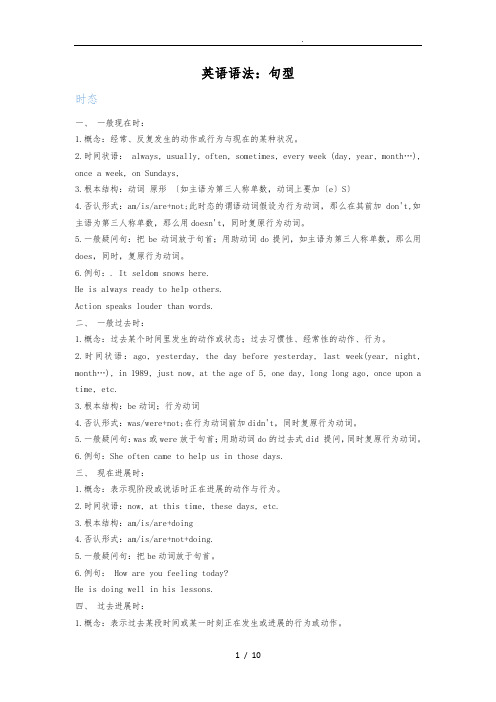
英语语法:句型时态一、一般现在时:1.概念:经常、反复发生的动作或行为与现在的某种状况。
2.时间状语: always, usually, often, sometimes, every week (day, year, month…), once a week, on Sundays,3.根本结构:动词原形〔如主语为第三人称单数,动词上要加〔e〕S〕4.否认形式:am/is/are+not;此时态的谓语动词假设为行为动词,那么在其前加don't,如主语为第三人称单数,那么用doesn't,同时复原行为动词。
5.一般疑问句:把be动词放于句首;用助动词do提问,如主语为第三人称单数,那么用does,同时,复原行为动词。
6.例句:. It seldom snows here.He is always ready to help others.Action speaks louder than words.二、一般过去时:1.概念:过去某个时间里发生的动作或状态;过去习惯性、经常性的动作、行为。
2.时间状语:ago, yesterday, the day before yesterday, last week(year, night, month…), in 1989, just now, at the age of 5, one day, long long ago, once upon a time, etc.3.根本结构:be动词;行为动词4.否认形式:was/were+not;在行为动词前加didn't,同时复原行为动词。
5.一般疑问句:was或were放于句首;用助动词do的过去式did 提问,同时复原行为动词。
6.例句:She often came to help us in those days.三、现在进展时:1.概念:表示现阶段或说话时正在进展的动作与行为。
2.时间状语:now, at this time, these days, etc.3.根本结构:am/is/are+doing4.否认形式:am/is/are+not+doing.5.一般疑问句:把be动词放于句首。
人教版初三英语动词的时态和语态复习
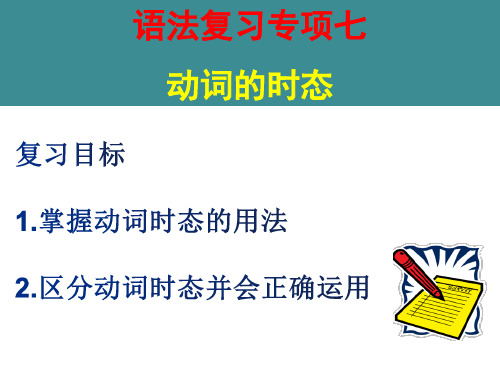
【中考链接】
( ) 1. —I heard your father had gone to Beijing on business.
—Yes. And he ____A___ in three weeks. A. will return B. has returned C. returned D. returns ( ) 2. Just go down this road and you __D_____
等,也常和
等引导的状语从句连用.
★必背句式 It is/has been+一段时间+since+一般过去时
It is/has been five years since he lived in China.
【中考链接】
( ) 1. —Are you going anywhere?
—I __D____ about visiting my sister, but I have changed my mind.
the library next to the bank. A. see B. saw C. have seen D. will see
( ) 3. We ____B___ have a picnic together with our teachers next Thursday.
A. are going B. are going to C. will going D. may going to
B. watches
C.was watching D.watching
3.-----Hey ,what did I say? -----I _________. A. I’m not listening B. I was not listening
时态和语态的区别和用法

时态和语态的区别和用法时态和语态是英语中非常重要的语法概念,对于学习英语的人来说特别重要。
时态和语态的正确使用能够准确表达出动作发生的时间和动作主体的关系,使语言更加准确、流畅。
本文将详细介绍时态和语态的区别和用法。
一、时态的定义和用法时态表示动作或状态发生的时间。
英语中常用的时态主要包括: 简单现在时、现在进行时、现在完成时、过去时、过去进行时、过去完成时、将来时等。
1. 简单现在时:表示经常、一贯性或普遍性的动作或状态。
例如:I eat breakfast every day.(我每天吃早餐)2. 现在进行时:表示现在时刻正在进行的动作。
例如:They are playing football in the park.(他们正在公园里踢足球)3. 现在完成时:表示过去某个时间点开始、持续到现在的动作。
例如:He has lived in London for five years.(他在伦敦住了五年了)4. 过去时:表示过去某个时间点或某段时间内发生的动作。
例如:She went to the cinema last night.(昨晚她去了电影院)5. 过去进行时:表示过去某个时间点或某段时间内正在进行的动作。
例如:He was studying when I called him.(我给他打电话时,他正在学习)6. 过去完成时:表示过去某个时间点之前已经完成的动作。
例如:They had finished their homework before dinner.(晚餐前,他们已经做完了作业)7. 将来时:表示将来某个时间点或某段时间内将要发生的动作。
例如:I will go shopping tomorrow.(明天我要去购物)二、语态的定义和用法语态表示句中主语和谓语动词的关系,主要包括:主动语态和被动语态。
1. 主动语态:表示主语是动作的执行者。
例如:He wrote a letter.(他写了一封信)2. 被动语态:表示主语是动作的承受者。
初三英语语法总结归纳
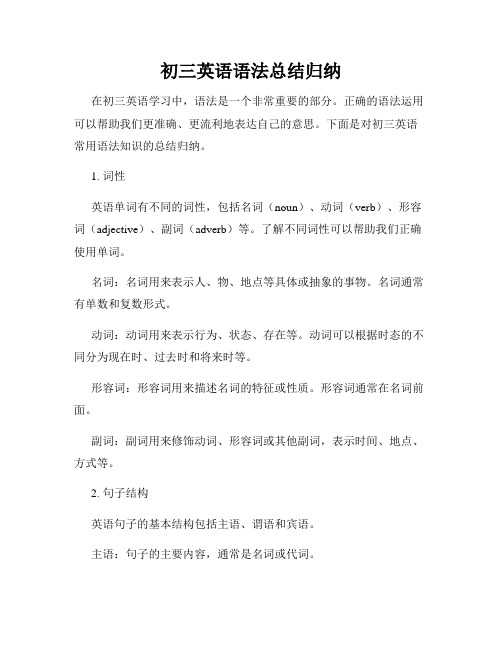
初三英语语法总结归纳在初三英语学习中,语法是一个非常重要的部分。
正确的语法运用可以帮助我们更准确、更流利地表达自己的意思。
下面是对初三英语常用语法知识的总结归纳。
1. 词性英语单词有不同的词性,包括名词(noun)、动词(verb)、形容词(adjective)、副词(adverb)等。
了解不同词性可以帮助我们正确使用单词。
名词:名词用来表示人、物、地点等具体或抽象的事物。
名词通常有单数和复数形式。
动词:动词用来表示行为、状态、存在等。
动词可以根据时态的不同分为现在时、过去时和将来时等。
形容词:形容词用来描述名词的特征或性质。
形容词通常在名词前面。
副词:副词用来修饰动词、形容词或其他副词,表示时间、地点、方式等。
2. 句子结构英语句子的基本结构包括主语、谓语和宾语。
主语:句子的主要内容,通常是名词或代词。
谓语:句子的核心,表达主语的动作或状态,通常是动词。
宾语:句子中受动作影响的人或物,通常是名词或代词。
3. 时态时态是指动词所表示的动作或状态所发生的时间。
在英语中,常用的时态包括现在时态、过去时态和将来时态。
现在时态:表示现在正在进行的动作或普遍性的真理。
过去时态:表示过去发生的动作或状态。
将来时态:表示将来将要发生的动作或状态。
4. 从句从句是一个句子结构,它包含一个主句和一个从句。
从句可以充当名词、形容词或副词。
名词从句:从句在句子中作为主语、宾语等成分。
形容词从句:从句在句子中修饰名词。
副词从句:从句在句子中修饰动词、形容词或副词。
5. 语态英语中的动词可以用不同的语态来表示句子的结构和意义。
常见的语态有主动语态和被动语态。
主动语态:表示主语是动作的执行者。
被动语态:表示主语是动作的承受者。
6. 语气语气是指句子所表达的情态或态度。
常见的语气有陈述语气、疑问语气、祈使语气和感叹语气。
陈述语气:用于陈述事实或提出观点。
疑问语气:用于提问。
祈使语气:用于表示请求或命令。
感叹语气:用于表达惊讶、喜悦、遗憾等感叹的情绪。
初三的英语语法知识点总结归纳

初三的英语语法知识点总结归纳英语作为一门重要的学科,语法是其基础和核心内容。
在初三阶段,学生需要全面掌握英语语法知识,以便正确运用语言表达自己的思想和理解他人的意思。
本文将对初三英语语法知识点进行总结归纳,帮助同学们快速复习和强化记忆。
一、词类与词性1. 名词(Noun):表示人、物、地点、抽象概念等。
2. 代词(Pronoun):代替名词,分为人称代词、物主代词、反身代词等。
3. 形容词(Adjective):修饰名词或代词,描述属性或特征。
4. 副词(Adverb):修饰动词、形容词和其他副词,表示程度、方式、时间等。
5. 动词(Verb):表示动作、状态或存在。
6. 介词(Preposition):表示位置、方向、时间、关系等。
7. 连词(Conjunction):连接词语、短语、从句等。
8. 冠词(Article):限定名词的用法,分为不定冠词(a/an)和定冠词(the)。
二、句子结构与语法规则1. 陈述句(Declarative Sentence):陈述一个事实或观点,语序为主语+谓语+宾语/补语。
2. 疑问句(Interrogative Sentence):用于提问,语序为助动词/特殊疑问词+主语+谓语+宾语/补语。
3. 祈使句(Imperative Sentence):表达命令、请求、建议等,语序为谓语+宾语/补语。
4. 感叹句(Exclamatory Sentence):表达强烈的感情或意见,语序为"What/how+adj./adv.!"。
5. 主谓一致:主语与谓语之间在人称、数上保持一致。
6. 定语从句(Adjective Clause):用来修饰名词或代词的从句,引导词有关系代词和关系副词。
7. 状语从句(Adverbial Clause):修饰动词、形容词和副词的从句,包括时间、地点、条件、原因等。
三、时态与语态1. 一般现在时(Simple Present):表示经常性、习惯性或普遍真理,动词原形。
专题12 动词的时态和语态-2022年中考英语考前冲刺语法图解过关课件

满分秘籍
巧学妙记
提分特训
1.(2021·贵州黔西·中考真题)—You seem to know much about the Palace Museum i
n Beijing.
—That’s true. I ________ it last year.
A.visited
B.are visiting C.have visited D.will visit
被动语态
满分秘籍
巧学妙记
提分特训
常见的五种时态的被动语态的结构如下:
时态
构成
am/is/are+ 一般现在时
done
例句 The Olympic Games is held every four years.奥运 会每四年举办一次。
was/were+don The 2008 Olympic Games was held in
The 2020 Olympic Games is being prepared now.2020年奥运会正在准备之中。
The Olympic Games has been held for 31 times.奥 运会已经举办了31届了。
被动语态 满分秘籍
巧学妙记
提分特训
口诀:被动语态be来变,过去分词跟后面。
A.have connected
B.connected
C.will connect
D.connect
【答案】A 【解析】 句意:到目前为止,高速列车已经连接了中国的大部分大城市。 从“So far”判断,句子是现在完成时,构成:have/has+动词的过去分词。 故选A。
满分秘籍
巧学妙记
什么是时态和语态
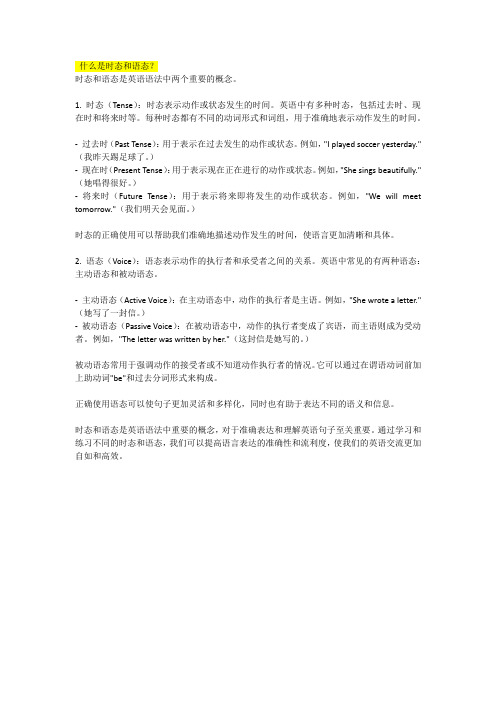
什么是时态和语态?时态和语态是英语语法中两个重要的概念。
1. 时态(Tense):时态表示动作或状态发生的时间。
英语中有多种时态,包括过去时、现在时和将来时等。
每种时态都有不同的动词形式和词组,用于准确地表示动作发生的时间。
-过去时(Past Tense):用于表示在过去发生的动作或状态。
例如,"I played soccer yesterday."(我昨天踢足球了。
)-现在时(Present Tense):用于表示现在正在进行的动作或状态。
例如,"She sings beautifully."(她唱得很好。
)-将来时(Future Tense):用于表示将来即将发生的动作或状态。
例如,"We will meet tomorrow."(我们明天会见面。
)时态的正确使用可以帮助我们准确地描述动作发生的时间,使语言更加清晰和具体。
2. 语态(Voice):语态表示动作的执行者和承受者之间的关系。
英语中常见的有两种语态:主动语态和被动语态。
-主动语态(Active Voice):在主动语态中,动作的执行者是主语。
例如,"She wrote a letter."(她写了一封信。
)-被动语态(Passive Voice):在被动语态中,动作的执行者变成了宾语,而主语则成为受动者。
例如,"The letter was written by her."(这封信是她写的。
)被动语态常用于强调动作的接受者或不知道动作执行者的情况。
它可以通过在谓语动词前加上助动词"be"和过去分词形式来构成。
正确使用语态可以使句子更加灵活和多样化,同时也有助于表达不同的语义和信息。
时态和语态是英语语法中重要的概念,对于准确表达和理解英语句子至关重要。
通过学习和练习不同的时态和语态,我们可以提高语言表达的准确性和流利度,使我们的英语交流更加自如和高效。
英语语法动词的时态与语态
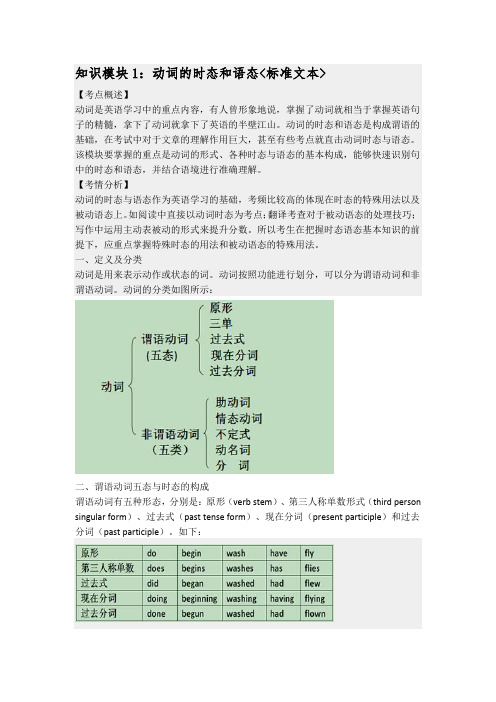
知识模块1:动词的时态和语态<标准文本>【考点概述】动词是英语学习中的重点内容,有人曾形象地说,掌握了动词就相当于掌握英语句子的精髓,拿下了动词就拿下了英语的半壁江山。
动词的时态和语态是构成谓语的基础,在考试中对于文章的理解作用巨大,甚至有些考点就直击动词时态与语态。
该模块要掌握的重点是动词的形式、各种时态与语态的基本构成,能够快速识别句中的时态和语态,并结合语境进行准确理解。
【考情分析】动词的时态与语态作为英语学习的基础,考频比较高的体现在时态的特殊用法以及被动语态上。
如阅读中直接以动词时态为考点;翻译考查对于被动语态的处理技巧;写作中运用主动表被动的形式来提升分数。
所以考生在把握时态语态基本知识的前提下,应重点掌握特殊时态的用法和被动语态的特殊用法。
一、定义及分类动词是用来表示动作或状态的词。
动词按照功能进行划分,可以分为谓语动词和非谓语动词。
动词的分类如图所示:二、谓语动词五态与时态的构成谓语动词有五种形态,分别是:原形(verb stem)、第三人称单数形式(third person singular form)、过去式(past tense form)、现在分词(present participle)和过去分词(past participle)。
如下:(一)谓语动词五态与时态相对应(如下图)所以,我们判断一个句子是什么时态时,只需把其谓语动词找出来,并判断其是五态中的哪一个,然后写上对应的汉字,即可快速判断该句话的时态。
例1:I have been being a teacher since 2004.(现在完成进行时)自从2004年起我一直做老师。
例2:I will have finished the task by 2 o’clock tomorrow.(将来完成时)我明天2点会完成任务。
(二)动词过去式与过去分词的构成规则1.规则变化⑴一般在动词原形后加-ed,如:betray-betrayed,oppress-oppressed(压迫)。
英语时态和语态

初三英语语法复习-------时态和语态( )1. There _______ no hospitals in my hometown fifty years ago.A. isB. areC. wasD. were( )2. --- Who sings best in your class? --- Jenny _______.A. doB. didC. doesD. has done( )3. --- _____ the young girl _____ the old man clean his room every day?--- Yes, she does.A. Does; helpB. Has; helpedC. Did; helpD. Do; helps( )4. --- Can I go to Beijing for my holiday, Dad?--- You can when you _______ a bit older.A. will getB. getC. are gettingD. got( )5. --- What does Linda often do in the evening?--- She often _______ her homework, but on the evening of March 12 she _______ TV.A. does; watchesB. is doing; watchedC. does; watchedD. is doing; was watching( )6. Our geography teacher told us yesterday that the earth _______ around the sun.A. was movingB. movedC. has movedD. moves( )7. If he _______harder, he will catch up with us soon.A. studyB. studiesC. will studyD. studied( )8. --- Don’t forget to ask him to write to me.--- I won’t. As soon as he _____, I’ll ask him to write to you.A. will comeB. cameC. comesD. is coming( )9. --- Do you like this silk dress?--- Yes, I do. It _______ so soft and comfortable.A. is feelingB. feelsC. has feltD. is felt( )10. Oh, it’s you. I’m sorry I _______ know you _______ here.A. don’t; areB. didn’t; areC. didn’t; wereD. don’t; were( )11. Mr Lu Xun died in 1936. He _______ a lot of famous novels.A. wroteB. was writingC. has writtenD. would write( )12. --- Your telephone number again? I _______ quite catch it.--- It’s 2567321.A. can’tB. couldn’tC. don’tD. didn’t( )13. --- How was your weekend on the farm?--- Great! We _______ with the farmers.A. enjoy ourselvesB. went fishingC. will workD. make friends( )14. --- What did Mr Jones do before he moved here?--- He _______ a city bus for over twenty-five years.A. is drivingB. droveC. has drivenD. drives ( )15. Jane _______ a new dress every month when she was in Shanghai.A. buysB. is buyingC. boughtD. will buy ( )16. --- Liu Mei can’t come tonight.--- Why? But she _______ me she would come.A. tellsB. toldC. is toldD. had told ( )17. He turned off the light and then _______.A. leavesB. has leftC. will leaveD. left ( )18. --- Keep quiet, please. They _______ a meeting.--- Sorry.A. haveB. hadC. are havingD. have had ( )19. --- Jimmy is leaving for a holiday.--- Really? Where _______ he _______?A. has; goneB. will; goC. did; goD. would; go ( )20. Frank _______ to see his grandma if he _______ free tomorrow.A. will come; will beB. comes; isC. will come; isD. comes; will be( )21. There _______ a talk on science in our school next Monday.A. will giveB. will beC. is going to giveD. is( )22. --- Shall we go shopping now?--- Sorry, I can’t. I _______ my shirts.A. washB. washesC. washedD. am washing ( )23. --- Hurry up! We’re all waiting for you.--- I _______ for an important phone call. Go without me.A. waitB. was waitingC. am waitingD. waited ( ) 24.Tomorrow is Lucy’s birthday. What _______ I get for her?A. shouldB. willC. mustD. need( )25.Why ______ give him some help?A. don’tB. not youC. don’t youD. haven’t( )26. --- _______ you _______ TV at the moment?--- No, you can turn it off.A. Did; watchB. Are; watchingC. Do; watchD. Have; watched( )27. I don’t think Jim saw me; he _______ a book at that moment.A. just readB. has just readC. was just readingD. had just read( )28. Mr Smith _______a book about China last year but I don’t know whether he has finished it.A. has writtenB. wroteC. had writtenD. was writing( )29. --- I called you at seven yesterday , but there was no answer.--- Oh, I am sorry. I _______ dinner at my friend’s home.A. am havingB. hadC. was havingD. have had( )30. --- Do you know Miss Wang?--- Yes. I first met her two years ago. She _______ at a radio shop at that time.A. was workingB. has workedC. is workingD. had worked( )31. Mr White _______ the newspaper, while his daughter _______TV.A. read; was watchingB. was reading; watchedC. was reading; was watchingD. read; watched( )32. --- I _______ you at the meeting. Why?--- I was ill.A. sawB. have seenC. not seeD. didn’t see( )33. When the teacher came in, the students _____about the new film.A. are talkingB. were talkingC. talkedD. talks( )34. The 2004 Athens Olympic Games _______ on August 13.A. has begunB. lastedC. beganD. has lasted( )35. Hurry up! The play _______ for ten minutes.A. has been onB. has begunC. had begunD. began( )36. --- May I speak to Mr Smith?--- Sorry, he _______ Australia. But he _______ in two days.A. has been to; will come backB. has gone to; will be backC. has been in; would come backD. is leaving for; does n’t come back( )37. I can’t go to see the film tonight, because I ______ my ticket.A. have lostB. lostC. will loseD. was losing( )38. --- What do you think of the film Harry Potter?--- It is very nice. I _______ it twice.A. will seeB. have seenC. sawD. see( )39. We _______to learn English five years ago. We _______ it for five years up to now.A. began; learnedB. begin; have learnedC. have begun; had learnedD. began; have learned( )40. --- What a nice bike! How long _______ you _______ it?--- Just two weeks.A. have; boughtB. did; buyC. have; hadD. are; having( )41. You don’t have to describe her. I _______ her several times.A. had metB. have metC. metD. meet( )42. --- I’m sorry to have kept you waiting.--- Oh, not at all. I _______ here only a few minutes.A. have comeB. had beenC. wasD. have been( )43. --- _______ my dictionary anywhere?--- Yes. I saw it on your desk a moment ago.A. Have you seenB. Do you seeC. Had you seenD. Would you see( )44. --- I haven’t heard from Li Jun for a long time.--- What do you think _______ to him?A. was happeningB. to happenC. has happenedD. had happened( )45. --- Do you know our town at all?--- No, this is the first time I _______ here.A. wasB. have beenC. cameD. am coming( )46.Could you ________ any noise? It’s time for rest.A. please makingB. not please makingC. please not makeD. please not to make( )47. --- How long _______ your father _______ the Party?--- For more than twenty years.A. has; joinedB. did; joinC. has; been inD. does; join( )48. Would you mind _______ your bike?A. moveB. to moveC. movingD. moved( )49. --- Do you know Betty very well?-- Yes, she and I ___ friends since we met in Guangzhou last summer.A. have madeB. have becomeC. have beenD. have turned( )50.While I ________, he said hello to me.A. readB. was readingC. am readingD. readedI. 选择填空。
- 1、下载文档前请自行甄别文档内容的完整性,平台不提供额外的编辑、内容补充、找答案等附加服务。
- 2、"仅部分预览"的文档,不可在线预览部分如存在完整性等问题,可反馈申请退款(可完整预览的文档不适用该条件!)。
- 3、如文档侵犯您的权益,请联系客服反馈,我们会尽快为您处理(人工客服工作时间:9:00-18:30)。
初三英语语法复习时态和语态)1. There ______ no hospitals in my hometown fifty years ago.A. isB. areC. wasD. were)2. --- Who sings best in your class? --- Jenny _______ .A. doB. didC. doesD. has done)3. --- _____ t he young girl _____ the old man clean his room every day?—Yes, she does.A. Does; helpB. Has; helpedC. Did; helpD. Do; helps)4. --- Can I go to Beijing for my holiday, Dad?---You can when you ______ a bit older.A. will getB. getC. are gettingD. got)5. --- What does Linda often do in the evening?---She often ______ her homework, but on the evening of March 12 she _______ T VA. does; watchesB. is doing; watchedC. does; watchedD. is doing; was watching)6. Our geography teacher told us yesterday that the earth ______ around the sun.A. was movingB. movedC. has movedD. moves)7. If he ______ harder, he will catch up with us soon.A. studyB. studiesC. will studyD. studied)8. --- Don" forget to ask him to write to me.---1 won' tAs soon as he ______ , I ' disk him to write to you.A. will comeB. cameC. comesD. is comi ng)9. --- Do you like this silk dress?—Yes, I do. It _______ so soft and comfortable.A. is feelingB. feelsC. has feltD. is felt)10. Oh, it 'you. I ' nsorry I _________ know you ________ h ere.A. don '折eB. didn ' ab;eC. didn ' vtpreD. don ' tyere)11. Mr Lu Xun died in 1936. He ______ a lot of famous novels.A. wroteB. was writingC. has writtenD. would write)12. — Your teleph one nu mber agai n? I ____ quite catch it.—It ; 2567321.A. can ' tB. couldn' tC. don ' tD. didn ' t)13. — How was your weekend on the farm?---Great! We _______ with the farmers.A. enjoy ourselves C. will workB. went fishing D. make friends)14. — What did Mr Jones do before he moved here?---He _______ a city bus for over twenty-five years.A. is drivingB. droveC. has drivenD. drives)15. Jane _______ a new dress every month when she was in Shanghai.A. buysB. is buyingC. boughtD. will buy)16. — Liu Mei can ' come tonight.---Why? But she _______ me she would come.A. tellsB. toldC. is toldD. had told)17. He turned off the light and then _______ .A. leavesB. has leftC. will leaveD. left)18. — Keep quiet, please. They ______ a meeting.---Sorry.A. haveB. hadC. are havingD. have had)19. — Jimmy is leaving for a holiday.---Really? Where _______ he _______ ?A. has; goneB. will; goC. did; goD. would; go )20. Frank to see his grandma if he free tomorrow.A. will come; will beB. comes; isC. will come; isD. comes; will be)21. There ______ a talk on scie nee in our school next Mon day.A. will giveB. will beC. is going to giveD. is)22. — Shall we go shopping now?---Sorry, I can ' It. ______ my shirts.A. washB. washesC. washedD. am washing)23. — Hurry up! WW reall waiting for you.---1 ______ for an important phone call. Go without me.A. waitB. was waitingC. am waitingD. waited )24.Tomorrow is Lucy ' birthday. What I get for her?A. shouldB. willC. mustD. need)25.Why ______ g ive him some help?A. don' tB. not youC. don ' youD. haven' t)26. --- ______ you _______ TV at the moment?---No, you can turn it off.A. Did; watchB. Are; watchingC. Do; watchD. Have; watched)27. I don ' think Jim saw me; he _______ a book at that moment.A. just readB. has just readC. was just readingD. had just read)28. Mr Smith _______ a book about China last year but I don ' know whether he has finished it.A. has writtenB. wroteC. had writtenD. was writing)29. — I called you at seven yesterday , but there was no answer.---Oh, I am sorry. I _______ dinner at my friend hojne.A. am havingB. hadC. was havingD. have had)30. — Do you know Miss Wang?—Yes. I first met her two years ago. She _______ at a radio shop at that time.A. was workingB. has workedC. is workingD. had worked)31. Mr White _______ t he newsp即er, while his daughter _______ TV.A. read; was watchingB. was reading; watchedC. was reading; was watchingD. read; watched)32. — I ______ you at the meeting. Why?—I was ill.A. sawB. have seenC. not seeD. didn ' t see)33. When the teacher came in, the students ____ a bout the new film.A. are talkingB. were talkingC. talkedD. talks)34. The 2004 Athens Olympic Games ______ on August 13.A. has begunB. lastedC. beganD. has lasted)35. Hurry up! The play ______ for ten minutes.A. has been onB. has begunC. had begunD. began)36. — May I speak to Mr Smith?---Sorry, he _______ Australia. But he _______ in two days.A. has been to; will come backB. has gone to; will be backC. has been in; would come backD. is leaving for; does n' t come back)37. I can ' t go to see the film tonight, because I _________ my ticket.A. have lostB. lostC. will loseD. was losing)38. — What do you think of the film Harry Potter?一-It is very nice. I _______ it twice.A. will seeB. have seenC. sawD. see)39. We ______ to learn English five years ago. We ________ i t for five years up to now.A. began; learnedB. begin; have learnedC. have begun; had learnedD. began; have learned)40. — What a nice bike! How long ______ you _______ it ?---Just two weeks.A. have; boughtB. did; buyC. have; hadD. are; having)41. You don ' t have to describe her. I __________ h er several times.A. had metB. have metC. metD. meet)42. — I ' m sorry to have kept you waiting.---Oh, not at all. I ______ here only a few minutes.A. have comeB. had beenC. wasD. have been)43. — _______ my dictionary anywhere?---Yes. I saw it on your desk a moment ago.A. Have you seenB. Do you seeC. Had you seenD. Would you see)44. — I haven ' t heard from Li Jun for a long time.---What do you think _______ to him?A. was happeningB. to happenC. has happenedD. had happened)45. — Do you know our town at all?---No, this is the first time I _______ here.A. wasB. have bee nC. cameD. am comi ng)46.Could you _______ any noise? It ' s time for rest.A. please makingB. not please makingC. please not makeD. please not to make)47. --- How long ______ your father _______ t he Party?---For more than twenty years.A. has; joinedB. did; joinC. has; been inD. does; join( )48. Would you mind _ your bike?A. moveB. to moveC. movingD. moved)49. --- Do you know Betty very well?-Yes, she and I ___ friends since we met in Guangzhou last summer.A. have madeB. have becomeC. have beenD. have turned)50.While I ________ , he said hello to me.A. readB. was readingC. am readingD. readedI.选择填空。
